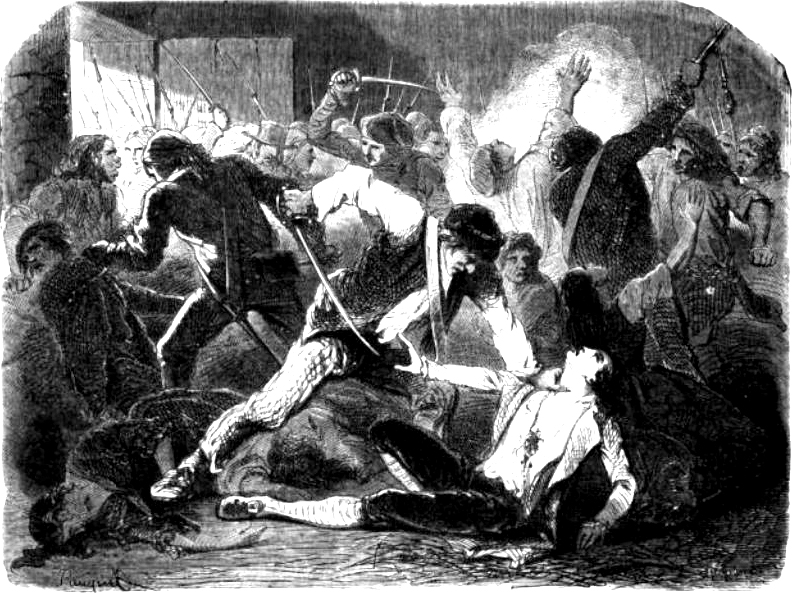 A lack of central authority during a period of national crisis led to one of the worst events of the French Revolution. On 2nd September 1792, news of the fall of the fortress at Verdun and the Prussian invasion of France and reached Paris. The last remaining deputies in the Constituent Assembly - soon to be replaced by the Legislative Assembly - ordered that the tocsin (alarm bell) be rung and that the alarm guns be fired.
A lack of central authority during a period of national crisis led to one of the worst events of the French Revolution. On 2nd September 1792, news of the fall of the fortress at Verdun and the Prussian invasion of France and reached Paris. The last remaining deputies in the Constituent Assembly - soon to be replaced by the Legislative Assembly - ordered that the tocsin (alarm bell) be rung and that the alarm guns be fired.The massacres began as a crowd attacked a group of non-juring priests on their way to imprisonment in the Abbey of Saint-Germain-des-Prés because they had refused to take the oath of loyalty to the Civil Constitution of the Clergy. The crowd mutilated and killed all twenty-four of them. Over the next few days, crowds broke into other prisons in Paris to attack the inmates. Some assailants feared that the prisoners would become counter-revolutionaries once the Prussians took Paris; some worried about the capital's diminishing food stocks; others just wanted bloody retribution.
Many other non-juring clergymen suffered the same fate as the twenty-four priests, including three bishops and over two-hundred priests. Imprisoned aristocrats also became a target for the killers, notably the Princesse de Lamballe, sister-in-law to the Duc d'Orleans and friend of Queen Marie Antoinette. Approximately twelve-hundred prisoners died during the five days of attacks.
Related posts
Meeting of the French Estates-General, 5th May 1789
The Tennis Court Oath, 20th June 1789
Feudalism abolished in France, 4th August 1789
Declaration of the Rights of Man and of the Citizen, 26th August 1789
Parisian women bring Louis XVI back to Paris, 6th October 1789
France reorganised into 83 départements, 4th March 1790
Paris celebrates la Fête de la Fédération, 14th July 1790
Guillotine used for first time, 25th April 1792
Louis XVI executed, 21st January 1793

It really is very important to remember that these things actually happened.
ReplyDeleteWow! This is one I never heard of. Thanks for the info!
ReplyDeleteThe French Revolution is really interesting. I have read 2 books on the subject. I really recommend people reading about it, really really interesting.
ReplyDeleteOnce again, an example of the separation of religion and beliefs that causes revolt and bloody disputes. Thanks for the history.
ReplyDeleteThank you all for leaving comments.
ReplyDeleteTricia: Which books?
Dr. L: Not to mention war, paranoia and factionalism.
Over the years I've failed to find anything but sorrow in the tales of the French Revolution.
ReplyDeleteSlap: I have found the occasional inspiring or heart-warming tale from the French Revolution. It did sweep away feudalism and slavery. But I grant you that it was often a bloody affair.
ReplyDeleteHi, umm iam not a nerd but this website is VERY cool. i want to learn more now.....THANKS GUYS!!!
ReplyDelete